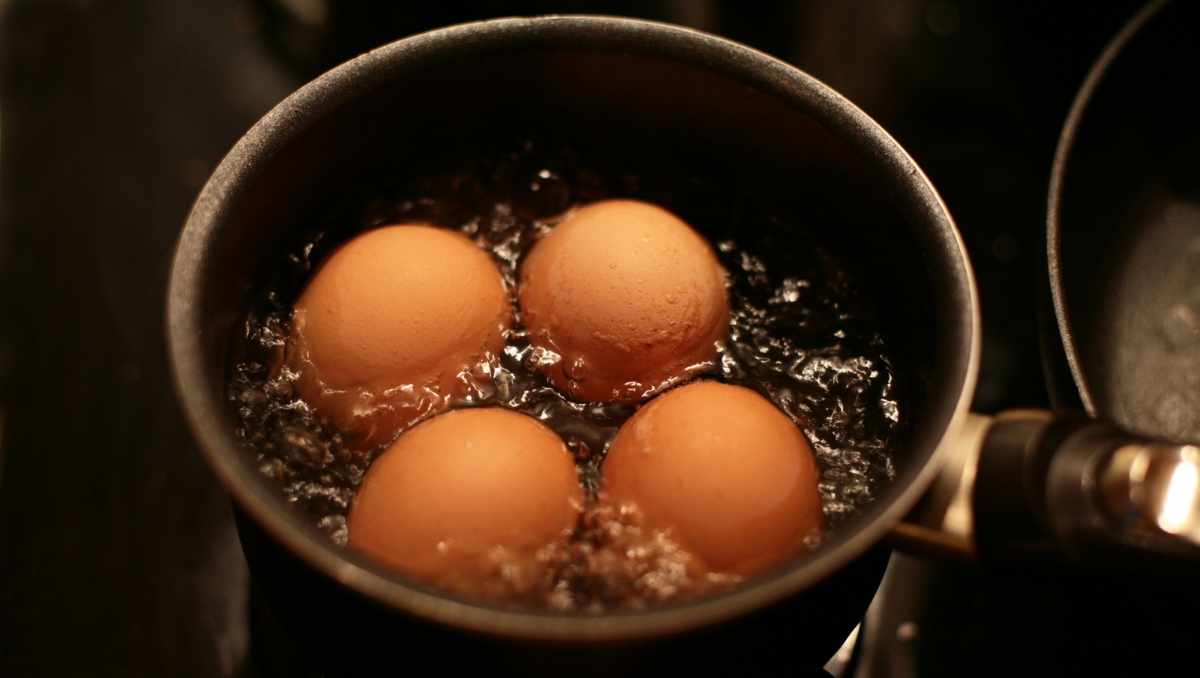This post contains affiliate links. See the affiliate disclaimer here.
Have you ever found yourself with leftover hardboiled eggs and wondered if you could give them a second life by reboiling them?
The good news is that you can! Reboiling eggs is a simple process that can be done with a few easy steps. In this article, we will guide you through the process of reboiling eggs and provide you with some tips on how to handle eggs safely.
So, if you’re curious about the answer to the question “Can you reboil eggs?” and want to learn more about boiled egg safety, keep reading!

Can You Reboil Eggs?
Reboiling eggs is a common practice, especially if you’ve cooked a batch of hard-boiled eggs and want to have them again. The good news is that you can reboil eggs. However, there are a few things to keep in mind to ensure that the process is safe and doesn’t impact the quality of the eggs.
When it comes to reboiling eggs, it’s best if they have been refrigerated first. This helps maintain their freshness and quality when boiled again. It’s important to note that boiling eggs for the second time might slightly affect their overall quality, but it’s a convenient solution when needed.
So, how do you go about reboiling eggs? Here’s a simple guide to help you out:
- Step 1: Put the eggs into a heat-resistant bowl or pan and add boiling water.
- Step 2: Make sure the eggs are completely immersed in water.
- Step 3: Leave the eggs to heat through for ten minutes, then serve and enjoy.
It’s essential to use boiling water to reheat the eggs, but do not use a microwave. The moisture inside the shell can cause the eggs to explode, creating a potential mess and safety hazard.
What about soft-boiled eggs? Can they be reboiled? The answer is yes but be prepared for them to turn into hard-boiled eggs. If you’re in a rush in the morning and want a quick breakfast, having a hard-boiled egg won’t be a problem.
To ensure that your eggs are correctly hard-boiled, it is recommended to let them boil for 12 minutes. This will give you perfectly cooked eggs with a solid yolk and a fully cooked white.
The Process of Reboiling Eggs
Reboiling eggs is a common practice and can be easily done with a few simple steps. Whether you want to turn your soft-boiled eggs into hard-boiled ones or if you’ve undercooked your eggs and want them fully cooked, reboiling is a great solution. Let’s walk through the process of reboiling eggs and ensure that you get the desired results.
Here’s the step-by-step guide for reboiling eggs:
- Refrigerate the eggs: Before reboiling, it’s important to refrigerate the eggs for a while. This helps in maintaining the quality and safety of the eggs during the process.
- Prepare a pot of fresh boiling water: Start by bringing a pot of fresh water to a rolling boil. It’s essential to use fresh water to ensure cleanliness and minimize any potential risks.
- Gently lower the eggs into the boiling water: Using a spoon or tongs, carefully place the eggs into the boiling water one by one. Take care not to drop the eggs, as they can crack or break.
- Adjust the heat and time: Once all the eggs are in the pot, reduce the heat to a medium-low setting. Allow the eggs to simmer in the gently boiling water for the desired duration.
For your reference, here’s a table outlining the recommended boiling times for different levels of doneness:
| Boiling Time | Egg Consistency |
|---|---|
| 4-6 minutes | Soft-boiled |
| 8-10 minutes | Medium-boiled |
| 12-14 minutes | Hard-boiled |
- Cool the eggs: Once the eggs have reached the desired consistency, remove them from the boiling water and immediately place them in a bowl of cold water. This halts the cooking process and makes it easier to peel the eggs later on.
By following these steps, you can confidently reboil your eggs and achieve the desired level of doneness. Just remember to refrigerate the eggs before reboiling and adjust the boiling time based on your preference.
Now that you know the process of reboiling eggs, let’s dive into some tips on undercooked eggs and safe handling practices to ensure both quality and safety.
Tips for Handling Eggs Safely
When it comes to handling eggs, it’s essential to prioritize safety. Here are some tips to ensure you handle your eggs in the best possible way:
- Check for Cracks: Always examine your eggs before using them. Cracked eggs can harbor harmful bacteria, so discard any eggs with cracks.
- Wash Your Hands: Before and after handling eggs, make sure to wash your hands thoroughly with warm water and soap. This helps prevent the spread of bacteria.
- Store Eggs Properly: Eggs should be stored in the refrigerator at a temperature of 40°F (4°C) or below. Keep them in their original carton to protect them from absorbing odors and from potential contamination.
- Avoid Cross-Contamination: Eggs can contain Salmonella, a bacteria that can cause foodborne illness. To prevent cross-contamination, never place cooked eggs or any other ready-to-eat foods on surfaces that have come into contact with raw eggs.
- Don’t Keep Eggs at Room Temperature: It’s important to note that eggs should not be left at room temperature for an extended period. They should be refrigerated promptly to maintain their freshness and reduce the risk of bacterial growth.
- Use Fresh Eggs: Always choose fresh eggs when cooking or baking. The freshness of an egg can be determined by its sell-by date, which is typically stamped on the carton. Fresh eggs have a higher chance of producing desirable results.
By following these tips, you can ensure that you handle your eggs properly, minimizing the risk of foodborne illness and maximizing the quality of your dishes. Safe egg handling is crucial for both taste and well-being.
Stay tuned for more useful information on how to reboil eggs and make the most of this versatile and nutritious food.
Factors to Consider for Reboiling Eggs
When it comes to reboiling eggs, there are a few factors you need to keep in mind. Reboiling eggs can be a convenient way to ensure that your eggs are cooked just the way you like them. However, it’s important to consider a few things before you proceed. Here are some factors to consider:
1. Safety: One of the main concerns when it comes to reboiling eggs is food safety. Eggs can harbor harmful bacteria, such as Salmonella, which can cause foodborne illness. It’s important to make sure that your eggs are cooked thoroughly to kill any potential bacteria. Reboiling eggs can be a safe option if the eggs have been undercooked the first time around.
2. Quality: Reboiling eggs can affect the quality of the egg. The longer the eggs are boiled, the more the proteins in the egg white coagulate, resulting in a firmer texture. However, overcooking the eggs can lead to a rubbery texture and an unpleasant taste. It’s important to find the right balance between cooking the eggs thoroughly and preserving their quality.
3. Texture: When reboiling eggs, you need to consider the desired texture. Some individuals prefer softer yolks, while others prefer a firmer consistency. To achieve the desired texture, you may need to adjust the boiling time accordingly. It’s always a good idea to test one egg before reboiling the rest to ensure that it meets your preferences.
4. Freshness: The freshness of the eggs is also an important factor to consider when reboiling. Fresh eggs cook more evenly and have a better flavor. If you’re unsure about the freshness of your eggs, you can perform a simple test. Place the egg in a bowl of water, and if it sinks completely and lays flat on the bottom, it’s fresh. However, if it stands upright or floats, it may not be as fresh and may not cook as well.
By considering these factors, you can make an informed decision when it comes to reboiling eggs. It’s important to prioritize food safety while also aiming for the desired quality and texture. Remember to check the freshness of your eggs, adjust the boiling time accordingly, and always cook them thoroughly to ensure your safety.
Conclusion
Now that you have all the necessary information, you can confidently reboil eggs with ease. By following the step-by-step guide provided in this article, you can ensure that your reboiled eggs are safe to eat and have the desired texture.
Remember to prioritize food safety by refrigerating your eggs before reboiling and using fresh boiling water. By doing so, you can minimize the risk of bacterial growth and ensure that your eggs are cooked thoroughly.
Additionally, consider adjusting the boiling time based on your desired texture. Whether you prefer a soft, medium, or hard-boiled egg, you can achieve the perfect consistency by adjusting the cooking time accordingly.
Lastly, always prioritize safety and quality when handling and cooking eggs. Check for cracks, wash your hands before and after handling eggs, and store them properly in the refrigerator to avoid any cross-contamination.
By following these tips and guidelines, you can confidently reboil eggs and enjoy them in a variety of dishes. So go ahead, give it a try, and savor the deliciousness of perfectly reboiled eggs!
Frequently Asked Questions
Is it OK to reheat eggs in the microwave?
No, reheating boiled eggs in the microwave can be hazardous as they may burst under extreme pressure. To reheat boiled eggs, place them in hot water until warm.
What happens if you put eggs in already boiling water?
Boiling water offers more control over timing but may result in rubbery egg whites. It also increases the risk of cracking as air in the egg has less time to escape.
Can you reverse a hard-boiled egg?
Technically, yes. A study proved that it’s possible to “unboil” a hard-cooked egg, but the texture may not be desirable for consumption.
Is it okay to reboil eggs?
Yes, you can safely reboil hard or soft boiled eggs by thoroughly cooking them. The texture and taste may be altered, but they are safe to eat.
Is it bad to reheat eggs twice?
Reheating eggs multiple times can increase the risk of bacterial contamination. It’s best to only reheat eggs once and consume them immediately.

